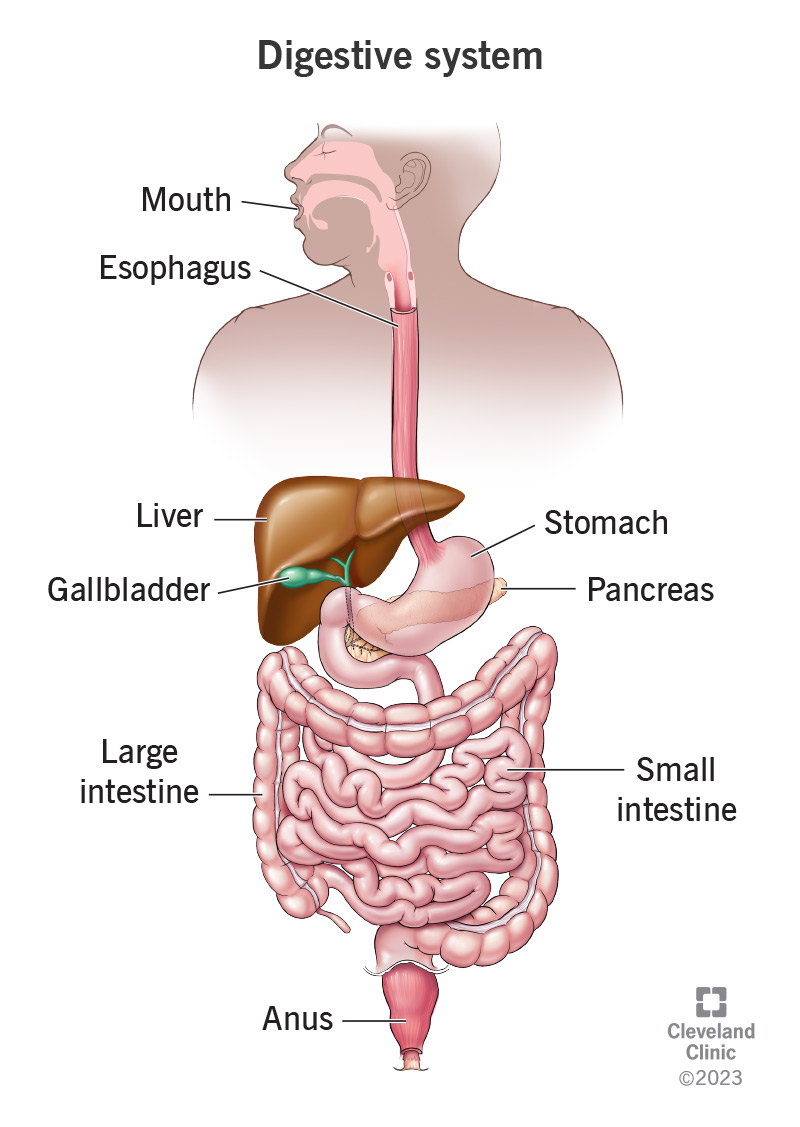Your digestive system sends food on an incredible journey through your body. Digestion is a complicated process. It involves many organs working together. These organs pull the nutrients from what you eat and drink that your body needs. Keeping your digestive system healthy and working well supports your overall health.
Advertisement
Cleveland Clinic is a non-profit academic medical center. Advertising on our site helps support our mission. We do not endorse non-Cleveland Clinic products or services. Policy

Image content: This image is available to view online.
View image online (https://my.clevelandclinic.org/-/scassets/Images/org/health/articles/7041-digestive-system)
Your digestive system is a group of organs that work together to digest and absorb nutrients from the food you eat. Digestion is a complicated process, and conditions and disorders can disrupt that process. Knowing how your digestive system works may help you keep it healthy and know when it may be time to get medical care.
Advertisement
Cleveland Clinic is a non-profit academic medical center. Advertising on our site helps support our mission. We do not endorse non-Cleveland Clinic products or services. Policy
Video content: This video is available to watch online.
View video online (https://cdnapisec.kaltura.com/p/2207941/sp/220794100/playManifest/entryId/1_51lwdp89/flavorId/1_5f3sgelj/format/url/protocol/https/a.mp4)
Learn more about how your digestive system works and how it performs the essential task of breaking down and absorbing the food and fluids you consume each day.
It breaks down and absorbs nutrients from the food and liquids you consume. Your digestive system also takes care of food waste — the stuff that’s left over after you digest food. Your digestive system turns food waste into poop (stool).
The digestive process involves lots of steps and several stops as food and liquid move through your digestive system:
The main parts of your digestive system are your gastrointestinal (GI) tract and your biliary tract:
Advertisement
Your GI tract is a long tube that runs from your mouth to your anus. If you could stretch it out, it would measure 30 feet (9 meters). It’s shorter in your body because your intestines — the longest parts of the tract — coil up in your lower abdomen (belly) under your stomach. Your GI tract parts are your:
Your biliary tract is in your upper abdomen (belly). Organs in your biliary tract support digestion by delivering bile and enzymes that help your small intestine break down food. Your biliary tract includes your:
Many different conditions and disorders can disrupt your digestive system. Some are acute, meaning they don’t last for long. Others may be long-term or chronic illnesses. And some — like colon cancer, esophageal cancer or liver cancer — are serious diseases that can be life-threatening. Examples include:
Advertisement
Almost all common digestive system disorders can cause the following symptoms:
If you’re like most people, you’ve had your share of occasional upset stomachs or loose poops that clear up within a few days. But any symptom that lasts for more than a few days, gets worse, or goes away and comes back is a reason to call a healthcare provider.
Healthcare providers may order one or more of the following tests to diagnose issues with your digestive system:
Advertisement
Your digestive system is complicated because it contains many different organs. That’s why there’s no one treatment for conditions or disorders that can affect it. In general, healthcare providers recommend treatments like:
In general, the following are ways to keep your digestive system healthy:
Advertisement
Every day, your digestive system literally churns what you eat and drink into the nutrients you need to stay healthy. It also gets rid of leftover food waste. You may not think about your hardworking gut unless you develop a condition or disorder that upends it and your daily routine. When that happens, give your digestive system a few days to recover. But don’t hesitate to contact a healthcare provider if your symptoms last or get worse.

Sign up for our Health Essentials emails for expert guidance on nutrition, fitness, sleep, skin care and more.
Learn more about the Health Library and our editorial process.
Cleveland Clinic’s health articles are based on evidence-backed information and review by medical professionals to ensure accuracy, reliability and up-to-date clinical standards.
Cleveland Clinic’s health articles are based on evidence-backed information and review by medical professionals to ensure accuracy, reliability and up-to-date clinical standards.
If you have issues with your digestive system, you need a team of experts you can trust. Our gastroenterology specialists at Cleveland Clinic can help.
